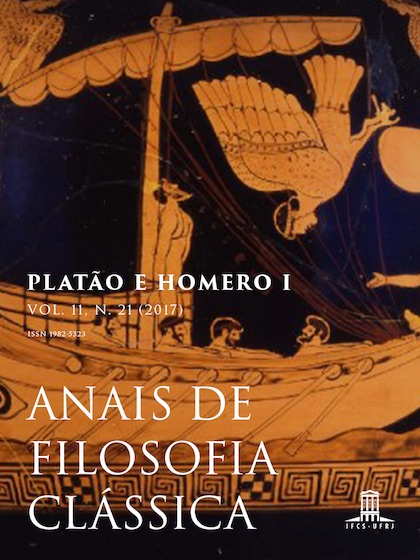Incantamenti. Il potere della parola orale in Socrate e i rapsodi e l'invenzione platonica della performance filosofica
DOI:
https://doi.org/10.47661/afcl.v11i21.16930Palavras-chave:
Ion, theory of performance, techne, knowledge, SocratesResumo
What Plato is complaining about Homer and poetry in the Republic is the same as what, in the Ion, Ion presents himself to be excellent in -- namely to affect the audience emotionally through poetic performances. Ion's excellence reveals itself to be without any knowledge: it is not a techne, but derives from divine inspiration. Plato's criticism towards poetry is directed to the lack of rational ground of Ion's professional ability, depicting rhapsody and poetry as irrational, and denying Homer any kind of authority regarding citizens' education. In this essay, I highlight the criticism moved by Plato against rhapsody within a contrastive interpretation of Socrates and Ion on performance, which aims to unpack the practical motive of Plato's writing, i.e. to establish a new cultural philosophical leadership for Athens. Since Socrates has built his method of inquiry within the public dimension of oral performance too, I argue that Plato would not criticize rhapsody and poetry in conservative manners, but, on the contrary, using the power of the persuasive language for his benefits. Therefore, he provides it a new meaning in the achievement of the epistemic goods, creating the new model of philosophical writing. Doing so, Plato presents himself as the new Homer, and philosophy as the only method that is able to assure knowledge.Downloads
Referências
BELFIORE, E. “Elenchus, epode, and magic. Socrates as silenus”. Phoenix 34(2), pp. 128-137, 1980.
BRISSON, L. “Platone e la questione del dualismo”. In Senza dualismo. Nuovi percorsi nella filosofia di Platone, ed. Laura Candiotto, pp. 35-43. Milano: Mimesis, 2015.
CAMBIANO, G. Platone e le tecniche. Torino: Einaudi, 1971.
CANDIOTTO, L. “Purification through emotions. The role of shame in Plato's Sophist 230b4-e5”, Educational Philosophy and Theory, 50, Issue 6-7, 2018: Bildung and paideia. Philosophical models of education, eds. J. Dillon, M. L. Zovko, pp. 576-585.
- Le vie della confutazione. I dialoghi socratici di Platone. Milano: Mimesis, 2012.
- “Il metodo adatto per Eutifrone: una calma distanza”. Peitho. Examina antiqua 1(2)/2011, pp. 39-55, 2011.
CAPPUCCINO, Carlotta. Filosofi e rapsodi. Testo, traduzione e commento allo Ione platonico. Bologna: Clueb, 2005.
CAPRA, A. Plato's Four Muses. The Phaedrus and the Poetics of Philosophy. Cambridge (MA): Harvard University Press, 2015.
GAMMEL, I. R. The Power of Beauty. On the Aesthetics of Homer, Plato, and Cicero. Aarhus: Aarhus University Press, 2015.
HALLIWELL, S. Between Ectasy and Truth. Interpretations of Greek Poetics from Homer to Longinus. Oxford: Oxford University Press, 2011.
KONSTAN, D. “Plato's Ion and the psychoanalytical theory of art”, paper presented at the 2004 annual meeting of the American Philological Association.
MOORE, J. D. “Limitation and Design in Plato's Ion”. Pacific Coast Philology 8, pp. 45-51, 1973.
MOTA, M. “Comic Dramaturgy in Plato. Observations from the Ion”. In Plato's Styles and Characters. Between Literature and Philosophy, ed. Gabriele Cornelli, pp. 157-172. Berlin-New York: De Gruyter, 2016.
MURRAY, P. Classical Literal Criticism. London: Penguin Classics, 2000.
REGALI, M. “La mimesis di sé nel discorso di Agatone: l'agone fra filosofia e poesia nel Simposio”. In Plato in Symposium, Selected Papers from the Tenth Symposium Platonicum, eds. M. Tulli, M. Erler, pp. 204-208. St. Augustin: Academia Verlag, 2016.
TRABATTONI, F. Platone. Roma: Carocci, 1998.
- “Sul significato dello Ione platonico”. Sandalion. Quaderni di cultura classica, cristiana e medioevale 8/9, pp. 27-57, 1985.
TULLI, M. “Plato and the Catalogue Form in Ion”. In Plato's Styles and Characters. Between Literature and Philosophy, ed. Gabriele Cornelli, pp. 203-210. Berlin-New York: De Gruyter, 2016.
VEGETTI, M. Quindici lezioni su Platone. Torino: Einaudi, 2003.
VERDENIUS, W. G. “L'Ion de Platon”. Mnemosyne III/11, pp. 233-262, 1942.


